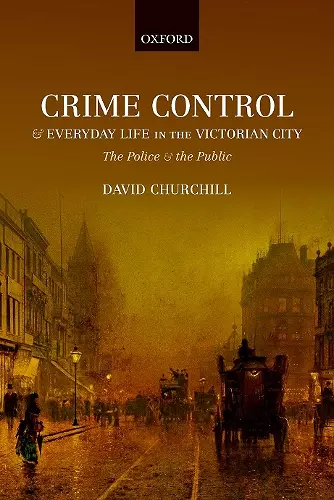Crime Control and Everyday Life in the Victorian City
The Police and the Public
Format:Hardback
Publisher:Oxford University Press
Published:11th Jan '18
Currently unavailable, and unfortunately no date known when it will be back

Winner of the 2019 SLSA Theory and History Prize
This new study shows how the history of British crime, policing, and criminal justice was shaped in cities like Leeds, Liverpool, and Manchester, detailing how Victorian police forces were organized, how they sought to deal with crime and urban disorder, how ordinary people dealt with crime and the police force as part of everyday life.The history of modern crime control is usually presented as a narrative of how the state wrested control over the governance of crime from the civilian public. Most accounts trace the decline of a participatory, discretionary culture of crime control in the early modern era, and its replacement by a centralized, bureaucratic system of responding to offending. The formation of the 'new' professional police forces in the nineteenth century is central to this narrative: henceforth, it is claimed, the priorities of criminal justice were to be set by the state, as ordinary people lost what authority they had once exercised over dealing with offenders. This book challenges this established view, and presents a fundamental reinterpretation of changes to crime control in the age of the new police. It breaks new ground by providing a highly detailed, empirical analysis of everyday crime control in Victorian provincial cities - revealing the tremendous activity which ordinary people displayed in responding to crime - alongside a rich survey of police organization and policing in practice. With unique conceptual clarity, it seeks to reorient modern criminal justice history away from its established preoccupation with state systems of policing and punishment, and move towards a more nuanced analysis of the governance of crime. More widely, the book provides a unique and valuable vantage point from which to rethink the role of civil society and the state in modern governance, the nature of agency and authority in Victorian England, and the historical antecedents of pluralized modes of crime control which characterize contemporary society.
[The book} is fluidly and interestingly written, with plenty of colour alongside the more detailed analysis of data. I would urge those interested in the history of policing and crime, in the control of urban space, of everyday life in urban society and of state/social relations, to consult Churchill's study. It is an important book which makes a significant contribution to the history of the Victorian city, and it deserves to be widely read. * Heather Shore, The English Historical Review *
I would not hesitate to recommend this book to readers who wish to enjoy a well-written reappraisal of the respective roles of both police and public in attempting to control crime within the Victorian city. Churchill is to be congratulated on a book that will make readers think and possibly reassess their views of both police and public during the Victorian era. * David J. Cox, Journal of Law and Society *
Churchill clearly possesses the instinct and craft of a historian: this is a meticulous and carefully researched study, guided throughout by a steadfast commitment to understanding the richness and complexity of the social world. * Thomas Guiney, Oxford Brookes University, Crime, Media, Culture *
no study has investigated Victorian crime control as a shared activity between police and public in this level of detail. This book will quickly be seen as a major new interpretation of Victorian polic-ing, the first truly innovative study in this field for quite some time. * Victor Bailey, Journal of British Studies *
This is a long book at nearly 300 pages, nevertheless it is fluidly and interestingly written, with plenty of colour alongside the more detailed analysis of data. Iwould urge those interested in the history of policing and crime, in the control of urban space, of everyday life in urban society and of state/social relations, to consult Churchills study. It is an important book which makes a significant contribution to the history of the Victorian city, and it deserves to be widelyread. * Heather Shore, English Historical Review *
One of the values of the work is the fact that Churchill refuses to be pigeonholed into police history, the history of crime, or social history; instead, he examines both the role of the police and the roles of civilians in tackling criminal activity ... A great strength of the work is Churchill's lively style, including his combination of broad analysis with engaging examples ... This style provides clarity for the reader and also brings to life the process of criminal justice administration and the everyday interactions between the police, victims, and offenders on the streets of Victorian cities. * Eleanor Bland, History *
For Criminologists and sociologists, as well as crime and social historians, these are fundamental considerations, and ones that make this book both a timely and welcome addition to research in this area. * David Orr, Cultural and Social History *
This is an original and readable book . . . it offers a valuable contribution to the question of how we can attempt to understand everyday responses to social problems in the nineteenth-century city. * Matt Neale, Urban History *
a substantial and original achievement in criminal justice scholarship. * P. T. Smith, CHOICE *
- Winner of Winner of the 2019 SLSA Theory and History Prize, awarded by the Socio-Legal Studies Association.
ISBN: 9780198797845
Dimensions: 241mm x 164mm x 25mm
Weight: 642g
308 pages